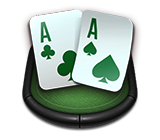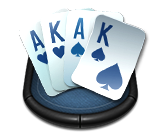
Pocket Jacks is a much-maligned hand. Despite being one of the strongest possible starting hands in Texas Hold’em, many people struggle to play it well. First of all, it can be tricky to know where you stand when there’s an overcard on the flop. And few feelings are worse than when you run into a bigger pair when holding fishhooks. But in this poker strategy article, we’ll help you learn to love pocket Jacks again.
Jacks Facts
Forget about all the times you ran your J-J into pocket Aces. Wipe it from your brain. The truth of the matter is that pocket Jacks is a massive favourite to win when facing almost every other hand. Up against two randomly selected cards, your J-J holds around 77% of the time.
Even against a suited A-K, you’ll be slightly ahead, winning a little under 54% of the time. You’re only truly crushed when holding pocket hooks if you’re against A-A, K-K, or Q-Q all in pre-flop; even then, you’ll get lucky in almost 20% of situations.
In most instances, though, in a raised pot, you'll be against overcards like Ace-King, Ace-Queen, or King-Queen. This scenario bears some significant risks, as you are in a coin-flip situation when facing these overcards in a showdown. In No-Limit Hold’em, it's advisable to play big pots with big hands, which drastically increases your chances of winning.
So readjust your mindset and drop any negativity you might feel towards what is clearly a top 5 premium Hold’em hand to play. With that little pep talk out of the way, let’s look at how to handle your hooks more effectively.
Pre-Flop Strategy With Pocket Jacks
 As with everything in poker, playing pocket Jacks correctly is not as simple as following an A-B-C strategy. You’ll always have to think about the number of players at the table, the style of those opponents, whether you are at a late or early position, and your chip stacks. There are countless other considerations to factor into the equation, too.
As with everything in poker, playing pocket Jacks correctly is not as simple as following an A-B-C strategy. You’ll always have to think about the number of players at the table, the style of those opponents, whether you are at a late or early position, and your chip stacks. There are countless other considerations to factor into the equation, too.
But, generally speaking, you want to try and protect the equity that you have. As we’ve already mentioned, Jacks are a favourite against almost every hand; massively so in many cases. And what’s the best way to realise your equity? Aggression.
Protect Your Equity
First of all, you must thin the field. Ideally, you want to get into a heads-up situation. If you can get all-in preflop, it guarantees that you’ll go to showdown. Not to mention removing those tricky decisions on boards containing lots of dangerous overcards.
What does this mean in practice? Well, if you’re short-stacked in a tournament situation, you can simply shove pre-flop. Pocket Jacks is too good of a hand to be folding, and if you’re prepared to play against a 3-bet, you might as well get the money in now.
How about in deepstack situations? Obviously, moving all-in is not smart under those circumstances, as you’re only likely to be called by the bigger pairs. But you can still be aggressive while looking to control the pot size.
Raising Pre-Flop
Open-raises and 3-bets are a must if you’re to have any chance of realizing your equity. But what is the right sort of percentage? Raising around 75% of the time feels about right. You can safely do so from any position, including under the gun. You will rarely want to call, but it can be justified in certain spots.
Fold around 20% of the time, usually in situations where you’re facing huge re-raises with deeper stacks. Look out for limp-raises too, as these can often indicate strong hands.
Post-Flop Considerations
The texture of the flop will make most of your decisions for you. If you’re looking at a real action flop, such as A-Q-7, you obviously need to proceed with caution. There are big hands like straight draws, flush draws, and overcards everywhere.
If you’re facing two opponents on such a board, where one bets out and the other raises, ditching your pocket Jacks should be a no-brainer. Yet this is one of the primary reasons why poker players struggle with J-J; they get too attached to the hand.
Pot Control
 Pot control remains extremely important with pocket Jacks. We have to accept that we’re likely to lose a big pot or win a small one. And with a high chance of overcards appearing on the board, we don’t want to unnecessarily build that big pot. Let’s look at an example.
Pot control remains extremely important with pocket Jacks. We have to accept that we’re likely to lose a big pot or win a small one. And with a high chance of overcards appearing on the board, we don’t want to unnecessarily build that big pot. Let’s look at an example.
You’ve made it to a flop of Q-8-3 against one player, and they bet out. Pre-flop, you had raised. They 3-bet, and you called. Are they really the type of player to do this with A-Q? Perhaps they are. But it seems more likely to be A-K, in which case you shouldn’t be scared of sticking around. It’s also quite possible they’re semi-bluffing with a flush draw or even a gutshot with something like J-T.
However, it makes no sense to raise in this spot. If they do have top pair and they raise, what can you do? Do you really want to get all-in here so lightly? And if you call, what happens on the turn? If it’s a brick and they shove, you’re in a horrible spot. But if it’s an Ace or King, you’re not looking great either. What card can you possibly be hoping for on the turn?
Calling and looking to control the pot is perfectly fine. Do so on all three streets if required.
Cash Games vs Tournament Play
There shouldn’t be a huge difference in your tournament approach to that of cash games. Since one mistake can end your tournament, you should expect players in freezeouts to be tighter in the early stages. If someone’s all-in 4-betting, you probably ought to ditch those hooks.
However, later on in a tournament, players have to start making moves. Their ranges will widen, so you can be less afraid of getting the money into the middle with pocket Jacks.
Pocket Jacks: Errors To Avoid
To summarise, these are the most common problems that players run into with J-J. Cut them out and you will find yourself playing pocket Jacks more effectively.
Overplaying pre-flop: Putting too much into the pot when deep-stacked or 4-betting when you ought to be flat calling;
Overcommitting post-flop: Getting married to the hand, resulting in spewing chips;
Missing out on value: Playing too passively with J-J and letting past experiences cloud your judgement;
Tilting: Don’t get too wound up about pocket Jacks. If your mindset is that you “always lose” with this hand, you’re likely to tilt when it does happen.
Pocket Jacks FAQs
Q: Should you go all-in with pocket Jacks?
This will heavily depend on your position in a game. Usually, it's not a good idea to call all-in re-raises, especially in situations when you play cash games, because there's a considerable risk that other players who go all-in will do so with big pocket pairs (often bigger than pocket Queens).
If you play pocket Jacks in a tournament, you can expect players to call all-in in later rounds, even with a relatively small pocket pair (like J-10). It's quite understandable to go all-in once the blinds get more substantial. In such a scenario, most hands get more valuable, which prompts you to take bigger risks.
Q: Are pocket 10s better than pocket Jacks?
Jacks is a stronger hand, but that doesn't mean that pocket 10s offer you significantly smaller chances of winning. Pocket 10s are still the highest of the middle pairs, and they can be very useful to a skilled player.
Jacks is considered a premium pair in no-limit Texas Hold’em, while pocket 10s can be viewed as a premium hand or middle pair, depending on the situation. In most cases, you won't see pocket 10s as an overpair on the flop since all premium hands can beat it.
Q: How often do pocket Jacks win?
The chances of winning with pocket Jacks are actually pretty high. There's a proximally 77% likelihood of winning with J-J against two random cards. As we mentioned earlier, pocket Jacks are considered premium hands in Hold'em, making them one of the most valuable sets of cards you could have in this game.
Now that you have read our tips on how to play pocket Jacks, it’s time to put them to practise.






























